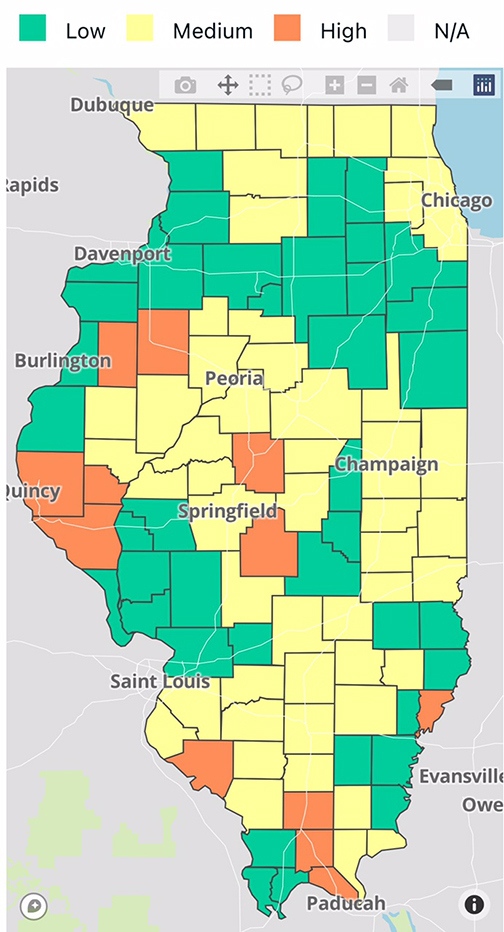CHICAGO – With COVID-19 cases and other respiratory viruses on the increase around Illinois, the Illinois Department of Public Health is reminding the public to take steps to protect themselves and their loved ones during the holiday season. This includes being fully vaccinated and boosted for COVID-19 and the flu and getting tested for COVID-19 before attending holiday gatherings, especially if you’ll be visiting someone at high risk for severe outcome.
Public health officials also urged Illinoisans who test positive to immediately contact a healthcare provider and discuss whether they should take one of the widely available and effective treatments for COVID-19.

IDPH is stressing these safety reminders as the CDC reported 63 Illinois counties are at an elevated Community Level for COVID-19 as of November 18, up from 46 counties at an elevated level in the previous week, with 12 counties at a High Community Level and 51 counties at a Medium Level.
In our area Randolph County went from a medium last week to a high as of Friday.
IDPH is reporting 20,495 new confirmed and probable cases of COVID-19 in Illinois since November 25, and 57 deaths.
“As we enter December and the weather continues to get colder, Illinois is beginning to see an anticipated increase in COVID-19 and other respiratory illnesses such as the flu,” said IDPH Director Dr. Sameer Vohra. “Please continue to take all preventative measure to protect yourself, your family, and friends, especially very young children and individuals over 65 who are most vulnerable to severe outcomes. These effective strategies include COVID-19 testing, especially if visiting someone at risk for severe disease; enhanced ventilation; good hand hygiene; staying home if sick; and getting up to date with both the COVID-19 bivalent booster and the flu shot.”
Dr. Vohra also noted that those who test positive for COVID-19 should immediately contact their healthcare provider to discuss whether they need treatment with one of the effective antiviral medications, Paxlovid, Lagverio and Remdesivir. All of these have been found to work against the current strains of the virus.
Access to tests and treatments can be found at the following test to treat site or by contacting your provider for treatment options, within five days of feeling ill.
IDPH is helping Illinoisans prepare for a potential fall and winter surge of COVID-19 cases by offering 1 million free COVID-19 rapid antigen tests to residents in economically disadvantaged zip codes through a partnership with the Rockefeller Foundation’s public charity, RF Catalytic Capital and its Project ACT (Access COVID Tests) program.
Through Project ACT, IDPH will be distributing one million at-home antigen tests to 200,000 Illinois families in zip codes outside the City of Chicago that are rated high on a Social Vulnerability Index (SVI). Households can find out if they are in an eligible zip code and request one package of five tests on a first-come-first-serve basis at the Project ACT website. The tests will be delivered to the home address.
Free or low cost COVID-19 testing locations are also available throughout the state, including in Chicago, and can be found on the IDPH website’s testing locator page.
The CDC authorized two new bivalent booster vaccines on September 1 that include an mRNA component of the original strain to provide an immune response that is broadly protective against COVID-19 and an added mRNA component in common between the omicron variant BA.4 and BA.5 lineages to provide better protection against COVID-19 caused by the omicron variant.
Initially, the Moderna COVID-19 Vaccine, Bivalent, was authorized for use as a single booster dose in individuals 18 years of age and older and the Pfizer-BioNTech COVID-19 Vaccine, Bivalent, was authorized for use as a single booster dose in individuals 12 years of age and older. On October 12, the CDC authorized the updated COVID-19 vaccines from Pfizer-BioNTech for children ages 5 through 11 years, and from Moderna for children and adolescents ages 6 through 17 years.
The updated boosters are available at pharmacies, hospitals, and other healthcare providers. The best way to locate a vaccine provider near you is to visit www.vaccines.gov and search for bivalent booster availability.
As of Friday, IDPH is reporting a total of 3,885,397 cases, including 35,494 deaths, in 102 counties in Illinois since the beginning of the pandemic.
As of Thursday night, 1,509 individuals in Illinois were reported to be in the hospital with COVID-19. Of those, 161 patients were in the ICU and 45 patients with COVID-19 were on ventilators. The preliminary seven-day statewide case rate is 161 COVID-19 cases per 100,000 Illinoisans.
The CDC recommends the following measures for people in areas that are rated at High Community Level for COVID-19 transmission:
Wear a well-fitting mask indoors in public, regardless of vaccination status (including in K-12 schools and other indoor community settings)
If you are immunocompromised or high risk for severe disease
Wear a mask or respirator that provides you with greater protection
Consider avoiding non-essential indoor activities in public where you could be exposed
Talk to your healthcare provider about whether you need to take other precautions
Have a plan for rapid testing if needed (e.g., having home tests or access to testing)
IF YOU TEST POSITIVE: Talk to your healthcare provider about whether you are a candidate for treatments like oral antivirals, and monoclonal antibodies
If you have household or social contact with someone at high risk for severe disease
consider self-testing to detect infection before contact
consider wearing a mask when indoors with them
Stay up to date with COVID-19 vaccines and boosters
Maintain improved ventilation throughout indoor spaces when possible
Follow CDC recommendations for isolation and quarantine, including getting tested if you are exposed to COVID-19 or have symptoms of COVID-19.
